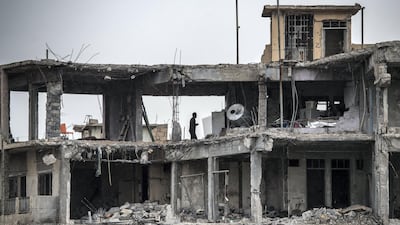Five trustees who ran a charity that collected money for orphans in Iraq were banned for misconduct after £1m ($1.38m) of funding disappeared.
The UK's Charity Commission closed down Orphan Relief Fund and Charitable Trust (ORFCT), which was generating more than £1m of funding every year, after trustees failed to show where the money was.
It was run by London-based Dr Wathib Al-Amood, who on his Facebook profile claims to be a politician, and four of his relatives – Ahmed Al-Amood, Sulieman Adam, Husham Al-Amood and Bushra Al Neama.
The watchdog found that Dr Al-Amood founded and ran the charity and his relatives played no active role.
It began investigating in 2017 and found £998,746 was transferred to an aid group called Iraqi Charity, also run by Dr Al-Amood, from ORFCT's bank account. The trustees were unable to provide evidence of how it was spent.
During the investigation, a further £88,515.63 was found transferred to Iraqi Charity, leading the watchdog to freeze ORFCT’s bank accounts.
It was found that Dr Al-Amood spent more than £35,000 using a charity credit card, with about £10,300 on personal expenses.
Despite claims he has repaid the charity, the watchdog has no evidence of this.
"With insufficient checks and balances in place, trustee A (Dr Al-Amood) was able to exert a significant role in the charity to its detriment," the commission said.
"The inability or unwillingness of trustees B to E to act in accordance with their legal duties … contributed to the misconduct and mismanagement at the charity."
Dr Al-Amood and his four relatives were banned from being trustees.
"Trustees play a crucial role in the governance of charities and are required to use their skills, knowledge and experience to run their charity well and in its best interests," the commission said.
"This charity was mismanaged by its trustees to its detriment. The inquiry concluded that the charity’s purposes could be promoted more effectively if it ceased to operate. The inquiry therefore took regulatory action to direct the charity to wind up and dissolve."
Tim Hopkins, the watchdog’s assistant director of investigations, said trustees shared a responsibility to ensure charities were run correctly.
"Charities must use their resources efficiently and effectively and be accountable to those that support them and to the commission as regulator. Former trustees of this charity failed to meet these expectations.
“I hope other trustees consider this case carefully and note particularly their shared responsibilities to ensure that their charity’s funds are applied solely for its charitable purposes and are fully accounted for.”


